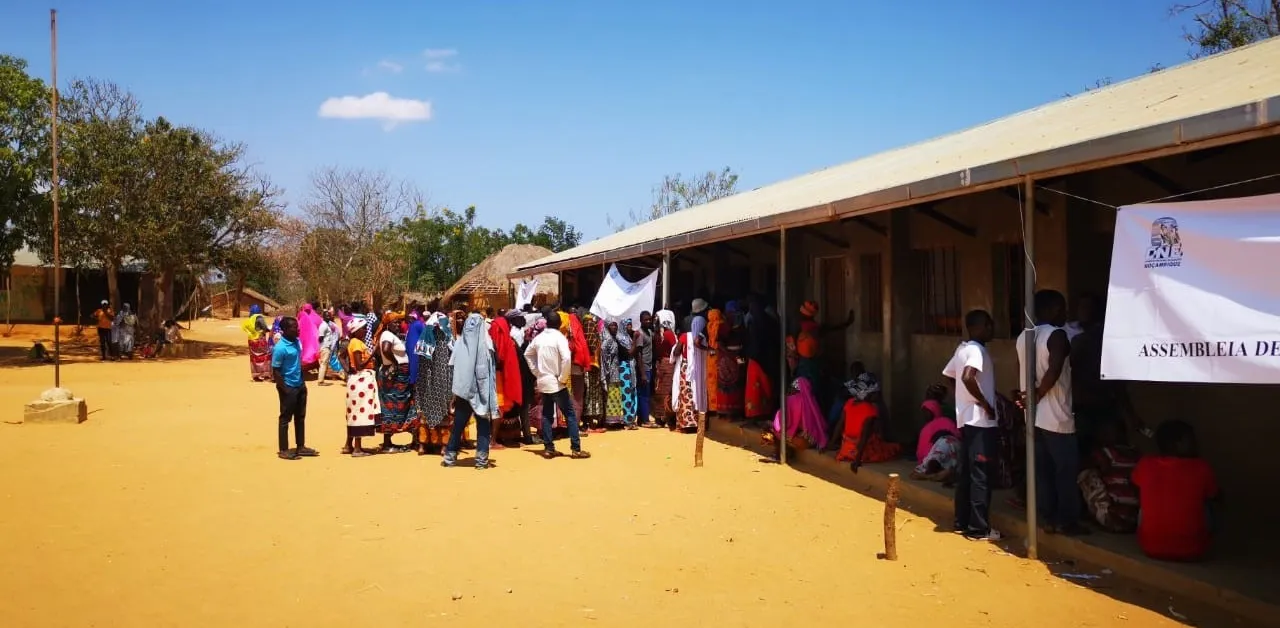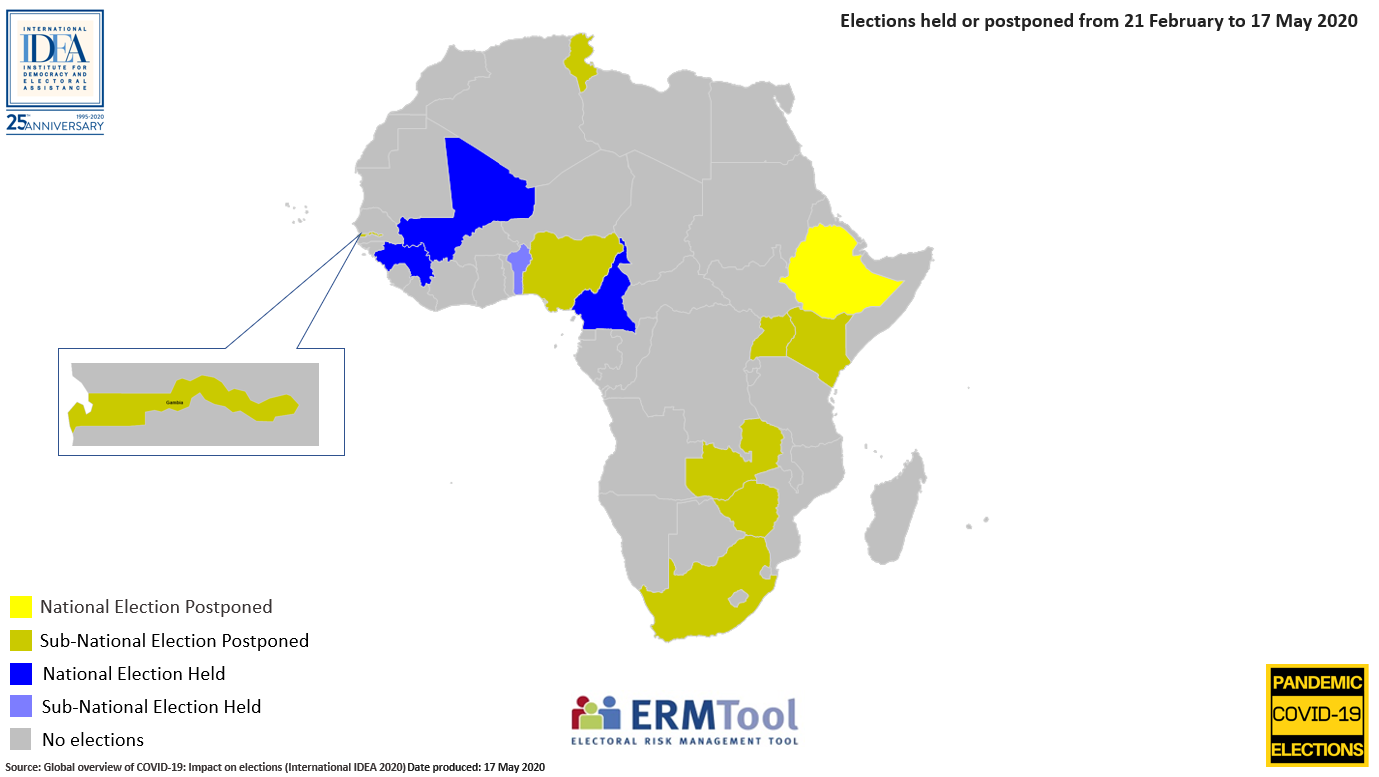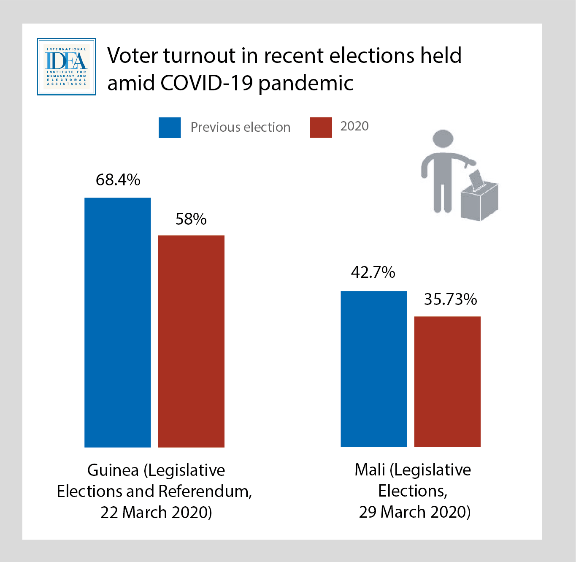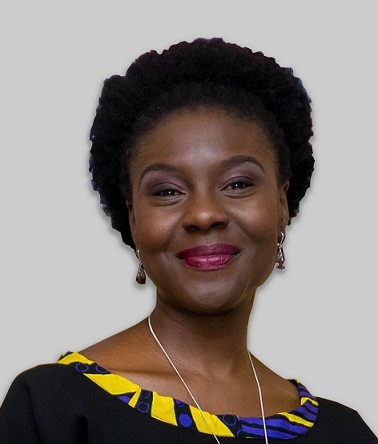The COVID-19 electoral landscape in Africa

Burundians will go to the polls on 20 May 2020 for presidential, legislative and local elections in spite of the risks posed by the coronavirus. As of 17 May, there were 27 confirmed cases of coronavirus and one death in the country, but the total figure of cases is believed to be higher. Since late April, large scale campaign events have taken place throughout the country without much attention to social distancing practices. This despite concerns voiced by the World Health Organization (WHO) which was on 12 May 2020 asked to immediately leave the country. In the meantime, the government has also asked that all foreign election observers to be quarantined for a 14-day period.
What does the pandemic mean for the electoral landscape in Africa, with 23 national elections scheduled in 22 African countries in 2020? For the rests of the year, there are elections scheduled to take place in Malawi (presidential), in July; Burkina Faso, Côte d’Ivoire, Egypt, Guinea (presidential), Liberia, Niger, Seychelles and Tanzania. It is not certain whether the elections in Chad, Central Africa Republic (CAR), Gabon, Somalia and Somaliland will take place as scheduled because these countries are faced with broader security and political challenges, now complicated by the pandemic.
Changes to scheduled elections
In early May, the chief electoral officer of the Independent Electoral Commission (IEC), South Africa stated, “there is no doubt that the post-COVID-19 electoral landscape will be significantly different in many respects.” These words were expressed at a time when the IEC postponed 30 municipal by-elections and voter registration activities until 1 June 2020, to mitigate the risk of further contagion and the likelihood of a low voter turnout. The IEC further mentioned in case the risks of cross contamination of people does not dissipate, the municipal elections scheduled to take place in 2021 may be affected.
According to International IDEA Global Overview of COVID-19: Impact on elections a total of eight countries have decided to postpone national and subnational elections planned in March up until August 2020. This includes subnational elections in Gambia, Kenya, Nigeria, Tunisia, Uganda, Zimbabwe as well as national elections in Ethiopia. Many of these postponements were decided on by the respective governments, legislatures or Electoral Management Bodies (EMBs), based on emergency response frameworks. In the case of Ethiopia, the National Electoral Board of Ethiopia consulted with political parties on the impact of COVID-19 which resulted in a broad political consensus regarding the postponement of the election.
During the same period, 4 countries have held national or subnational elections. This includes Guinea (22 March), Cameroon (22 March), Mali (29 March and 19 April) and Benin (17 May). All elections took place during a context of contagion with 2 reported cases in Guinea, 40 cases in Cameroon, 18 cases/224 cases (first and second round) in Mali and 338 cases in Benin.

Elections held so far:
Protective measures were employed for all four elections that were held amidst the pandemic in Benin, Cameroon, Guinea and Mali. These measures included: deep cleaning of polling stations before, during and after polling; mandatory use of masks and gloves for election officials; temperature checks at polling stations; provision of handwashing facilities and sanitizers for voters at polling stations; social distancing at the polling stations; and restrictions on number of persons present per room during voting and counting was done in centralized locations. Of particular interest is Benin, where all in-person campaign events were canceled, as gatherings of over 50 people were prohibited, forcing candidates to focus more on media appearances and campaign posters.
Voter turnout for the Guinea and Mali election (see figure 2) was low in comparison to past elections. For example, the Guinea provisional voter turnout was 58 per cent, which was lower than 68.4 per cent in the 2015 presidential election. In Mali, voter turnout for the first round elections on 29 March was 35.58 per cent, which dropped to 35.25 per cent in the second round parliamentary elections held on 19 April. Turnout in the 2020 elections was low compared to 42.7 per cent in the 2013 parliamentary election. Provisional voter turnout for Benin local elections during the time of writing has not been released.

There have been reports of further contagion during the election period. As of 17 May 2020 coronavirus cases in each country has increased. Guinea has 2658 coronavirus cases including 16 deaths; Cameroon has 3105 cases and 140 deaths; and Mali 860 cases and 52 deaths. In each of the aforementioned countries, the cases of coronavirus started to grow rapidly in the weeks after the elections as illustrated by Worldometer country data/graphs. The President of INEC, died from COVID-19 on 17 April 2020, it is believed that he contracted the virus during the election period.
Elections in the second half of the year
For the rest of 2020, there are more than a dozen scheduled national, regional or local elections in Africa. Elections are continuous processes that involved a complex interplay of activities that are technical in nature but carry deep political and legal implications. The quality of an election management body’s (EMB) preparation for an election is crucial for the overall success of the process. The pandemic has necessitated varying degrees of restrictions and emergency measures, imposed by governments, thus affecting the implementation of important pre-election activities.
In the cases of Burkina Faso, Cote d’Ivoire, Malawi, Niger and Ghana some electoral preparations have been delayed or postponed. These include the voter registration, the training of staff, local commissioners and electoral agents. Party Primary elections in Ghana have also been postponed. These postponements may cause overall changes in the election calendar.
EMBs in many sub-Saharan African countries depend largely on international procurement of sensitive election materials, as the capacity to produce locally is not readily available. The closure of international borders and of production centres in the supplying markets in response to the pandemic make international procurement a challenge, as seen in Liberia.
Can we still hold safe elections?
Many countries outside Africa that have either postponed, held or are planning to hold elections in 2020 have looked at Special Voting Arrangements (SVA) as an option that can allow elections to take place during a time of contagion. For example, local EMBs in Bavaria, Germany and the USA have introduced postal voting for subnational elections.
While the infrastructure in Africa may not support postal and online voting, other SVAs could be considered. South Africa and some other countries have SVAs for the elderly, the invalid and persons on election duty. The special voting allows these vulnerable voters to vote in advance (two days earlier), it also provides the possibility of home visits. Such SVAs could allow for staggered voting to reduce the pressure on voters on election day. However, in the context of the pandemic, the home visits should be modified to reduce the human contact between the officials and the voters who are at risk of contracting the virus. Mauritius which has voting by proxy could potentially extend the SVA to the elderly or persons who are infected by COVID-19.
In March 2020, International IDEA published a technical paper that lists some alternative mechanisms of campaigning and remote voting methods. This includes campaigning through Internet or via social media platforms or voting by post or online through a computer or mobile phone application. If postal or online voting is deemed inappropriate, then other in-person arrangements can be made in order to decrease the risk of contagion. This includes either introducing advance voting or extending advance voting arrangements to a larger group of people if the election code allows. In South Korea, the National Election Commission (NEC) encouraged all voters to cast their vote before election day at any of the 3,500 polling stations that were setup throughout the country. The rational for early voting was to allow a large group of people to vote before election day irrespective of their residence. In the end 26.69 per cent (or 11.74 million) of voters cast their vote through early voting provisions. This measure reduced the risk contagion as less people gathered together to vote on election day. It also reduced voter disenfranchisement and contributed to a historic high 66.2 per cent (29.12 million ballots cast)voter turnout in the country.
If new voting arrangements are proposed, or enacted good practice dictates that new laws need to be agreed typically between six months (as per article 2 of the ECOWAS protocol on Good Governance) to one year (as per Venice Commission, code of good practice in electoral matters) before elections take place, in order to uphold the principle of electoral law stability. A distinction should be made of what represents a major change in the electoral system and what are relatively more technical aspects that an EMB can adopt in a shorter period of time. Broad consensus of new voting arrangements will increase the integrity of the election and its eventual outcome. Therefore, all countries planning to hold elections in 2020 or early 2021 during a time of contagion need to start discussing these arrangements across party lines and through inter-agency forums as soon as possible.
A shortened version of this article was published by African Arguments on 20 May 2020 and is available via their website.
Disclaimer: Views expressed in this commentary are those of the author, who is a staff member of International IDEA. This commentary is independent of specific national or political interests. Views expressed do not necessarily represent the institutional position of International IDEA, its Board of Advisers or its Council of Member States.





